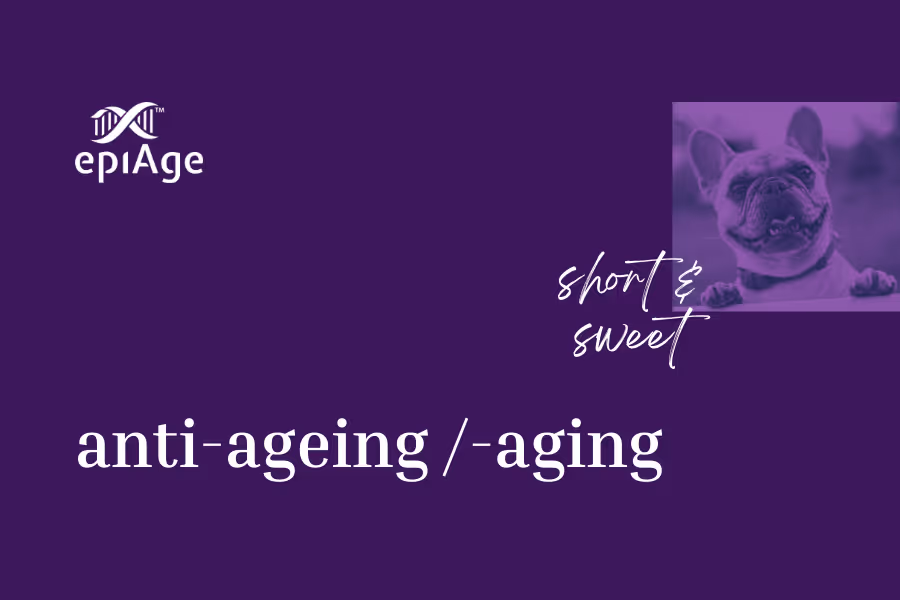Missed “short & sweet” instalment no. 2 on “hallmarks of ageing”? Catch up here!
At epiAge, we still wince at the use of “anti-ageing” and prefer “longevity” as an umbrella term for the goal we are contributing towards. Why is that? “Anti-ageing” is just about fighting against ageing, isn’t it? And, since it’s so pervasive and we’re all in the same boat, that’s legitimate, right?
Hmm, just listen in to this conversation snippet between two friends:
- Wow, you look amazing today! What have you done to your face?
- Shush, it’s thanks to “a little help from my friends”… Have you heard of Doctor X, the new anti-ageing guru on Harley Street? Well, I’ve just plundered my savings, but I think it was really worth it…
Sounds familiar? If not in your immediate circle, perhaps from a film or a magazine? Because even if you’re not into anti-ageing, you’re bound to have witnessed anti-ageing’s more accessible offshoots, such as creams and supplements, on the shelves of your local pharmacy.
And that’s why the“anti-ageing” label feels so uncomfortable.
For too long, anti-ageing has been associated with the superficial or surface-ageing of the body linked to frenzied marketing promises that leave little space for truly science-backed claims.
And this discomfort goes back to its original use. Indeed, according to the Oxford English Dictionary, the term made its first appearance in the English language in the 1910s, related to a US patent – possibly the one filed by Lorenzo D. Cornish for a mechanical wrinkle remover in 1915.
This means that “anti-ageing” is a relatively new coinage based on an entrepreneurial claim. Hence, in very broad terms: “Anti-aging, which is generally used as the opposite concept of aging, can be defined as a kind of science used to prolong the lifespan and delay aging while maintaining the physical, functional, and aesthetic beauty of the body.” (Ok, 2022)
It is only now, in the 21st century, that anti-ageing is beginning to shake off some of its commercial undertones to garner scientific traction. Even if it its evolution is still riddled with controversies linked to unproven treatments…
Hence, anti-aging’s legitimacy will only unfurl if it emphasises health over aesthetics and is associated with rigorously science-based diagnostic and medicine, as put by Seung-Cheol Ok: “[…] anti-aging diagnostic and medicine, which is part of medical and healthcare, applies advanced science and medical technology for the early detection, prevention, treatment, and reversal of age-related dysfunctions, disorders, and diseases”. And further: “Anti-aging medicine contributes to prolonging healthy life and reducing the chances of developing various age-related diseases, including intervening in the biological process of aging.” (Ok, 2022)
Then there is the somewhat militant prefix "anti"... Can you ever hope to win against "ageing" or could there be a less confrontational strategy?
So, for epiAge, anti-ageing only makes sense when it is associated with the ideas of “longevity” and “healthspan” – two concepts we will be examining in our next “short & sweet” posts...
Read on here: “short& sweet” instalment no. 4 on “longevity”
++++
Sources and further reading
“anti-ageing”, Oxford English Dictionary. Online: https://www.oed.com/dictionary/anti-ageing_adj
Lorenzo D. Cornish, US Patent for wrinkle-remover (filed 1915, granted 1917): https://patents.google.com/patent/US1215117A/en and https://patentimages.storage.googleapis.com/19/0e/f0/3c9cf814abdf08/US1215117.pdf
Mykytyn, C.E. “Contentious terminology and complicated cartography of anti-agingmedicine”. Biogerontology 7, 279–285 (2006).https://doi.org/10.1007/s10522-006-9016-z. Online: https://link.springer.com/article/10.1007/s10522-006-9016-z
Walker RF. “Onthe evolution of anti-aging medicine”. Clin Interv Aging. 2006;1(3):201-3. doi: 10.2147/ciia.2006.1.3.201. Online: https://www.ncbi.nlm.nih.gov/pmc/articles/PMC2695179/
“American Academy of Anti-Aging Medicine”, Wikipedia. Online: https://en.wikipedia.org/wiki/American_Academy_of_Anti-Aging_Medicine
Ok SC. “Insights into the Anti-Aging Prevention and Diagnostic Medicine and Healthcare”. Diagnostics (Basel). 2022 Mar 26;12(4):819. doi: 10.3390/diagnostics12040819. Online: https://www.ncbi.nlm.nih.gov/pmc/articles/PMC9028886/
Illustration
pixabay & epiAge
 Back to all posts
Back to all posts